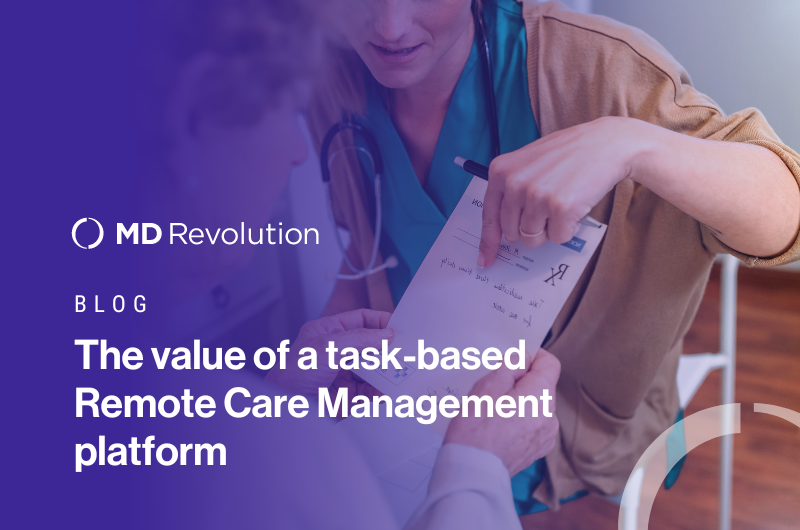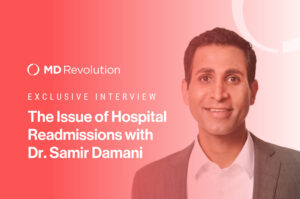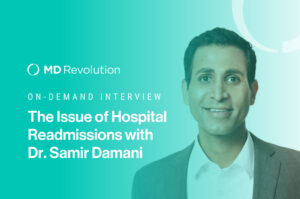Are Operational Demands Taking a Toll on You and Your Team? Help is Here.
Many clinicians tell us that they do not have the support to do one more thing beyond what they are already doing. And understandably so.
You’re facing an escalating workload due to more care coordination tasks to complete, more health histories to manage, more data and disproportionate alerts to review—not to mention an ever-growing mountain of administrative burdens. As a result, time is taken away from the patients who need care most, and clinical staff fatigue and burnout is at an all-time high. To make matters worse, many of you are experiencing no or very little reimbursement for the tasks noted above.
- What opportunities can apply sensibilities to these challenges?
- What if most of physician tasks could be automated with AI-assisted pathways and managed by real clinicians ready to do the work—remotely?
- What if routine tasks, at times perceived as less value, actually inform better clinical decision making?
- What if those same tasks could be captured, tracked, and compliantly categorized to fulfill reimbursable CMS codes for remote care delivery?
What if is now the reality with solutions like RevUp, our task-based platform that’s purpose-built to do one thing — deliver the process and technology you need to remotely manage your patients in between office visits. The truth is, many clinicians lack remote care programs, such as Chronic Care Management and Remote Patient Monitoring, and those who have them often struggle with their time demands and how little they get in return for their effort. But with task-based software that plans and informs remote care delivery, providers can begin to realize operational efficiencies and improved quality, and ultimately maximize their reimbursement potential for work already being done.
So, what is a task-based platform?
Our platform has been built to support and enable proactively planned tasks that place patients on an apprised, responsive care path. The patient is aware of their diagnoses and receive task-based guidance based on their health needs, but those tasks have flexibility to evolve with the patient and their conditions. Each month a dedicated care coordinator calls the patient to check on how they are doing and what they are doing for their health and can assign tasks to deliver an appropriate next step based on the interaction. Care plans built in a tasking environment mirror the quality of care delivered in the providers office, but are a continuation of attentive care — with more frequent touch points.
Most other remote care management solutions offer template-based platforms, rather than task-based platforms. These platforms have pre-built care paths that lack the customization that a task-based platform offers from the onset of engagement. Further, templated care plans for two or more coexisting conditions often lack the flexibility to adjust to individual patient needs as their health status changes, or as overlapping comorbidities shift in their need for responsive treatment.
A task-based remote care platform offers three key benefits in care delivery
Improves patient engagement and accountability
Tasks assigned to patients themselves can improve engagement by providing patients with clear instructions and reminders related to their health, such as taking medication or measuring their vitals. Patients are more likely to stay engaged and motivated when they have a clear understanding of what they need to do and when, and the content is relevant to their current health status. Accountability improves when there is a consistent feedback loop on their vitals and overall progress. In other words, patients are more responsive when their care is more responsive.
Enhances physician efficiency while ensuring high-quality care
Platforms built with fluid, customizable tasks allow providers to bring their care plan to life, without muddying their ability to operate at the top of their license. With a task-based and AI-assisted platform, patients can easily report their progress and health measures, and this data helps track patients’ health status and progress over time, helps care coordinators identify potential issues or trends, and helps providers make informed decisions about treatment. Task-based platforms facilitate better communication between patients and the appropriate care team license, allowing patients to ask questions, receive feedback, and share concerns in real-time without adding to provider workload.
Many times, tasks are assigned to provide a clinical assessment or screening, and future tasks are customized to match the assessment detail and specific patient data. Meanwhile, work performed in the course of care delivery is being captured and clinically documented. Care teams can also use tasking to send reminders and notifications to patients, improving communication and adherence to treatment plans.
The flexibility enabled by tasking means that care coordinators can schedule follow-up tasks, coordinate efforts across teams, track these efforts and report back to providers. And since care coordinators already engaging with patients on a regular basis, they can align other practice goals while delivering care.
Conversely, if a patient with chronic conditions has a templated and static care plan, there is a greater chance of existing care gaps remaining intact; the natural progression being regression into the disease state.
Increases overall practice efficiency while minimizing risk
Task-based platforms improve practice efficiency by automating certain tasks and prioritizing patient needs across care team roles. Providers collect more accurate and comprehensive data without experiencing alert fatigue, because the platform supports AI-assisted pathways and practice escalation protocols. Front-line patient escalations are managed with care team and nursing oversight and are communicated back to the practice by tasking — directly within the EHR. Follow up escalation tasks ensure that proper attention is given, and the next indicated step is planned. Providers can focus on patients who need more attention while ensuring that all patients are receiving appropriate care that identifies potential health complications early on.
Moreover, these care activities are time-stamped and recorded, so that all tasks completed align with Medicare billing requirements.
What every practice should seek out in a task-based platform
When creating our task-based platform, we applied more than a decade of experience working with practices and physicians to ensure it would support the most efficient, and quality-enhancing processes. Key capabilities, unique to our platform, include:
- Time-tracked tasking accurately captures all work performed in the course of care delivery — including ordering, review of health history, call attempts made, follow-up activities, vitals monitoring, practice escalations and much more
- Full EHR integration – no third-party logins required, no extra clicks
- Flexibility to assign role-based tasks for distributed workforce enablement, adjusting as needed at the practice, provider, and patient level
- Triggered alerts that are sent only when clinically relevant, such as when captured vitals fall outside of a critical threshold. Our practice partners have benefited from more than 100,000 avoided alert escalations from remote monitoring, assessed and managed by RevUp.
To maximize program efficiency and results, many practices choose to not only use our task-based platform, but also to partner with us for our RPM and CCM clinical services. When they do so, our clinical team provides care coordination on behalf of the practice. In this model, the practice-view is of clinical documentation and vital measures within the integrated EHR, activities building to compliantly fulfill billable codes for RPM and CCM. In some cases, RevUp has managed 100% of the task volume associated with RPM and CCM service delivery. To date, this has equated to over 1.3 million tasks completed in support of the overseeing provider – the same provider that doesn’t have time to do one more thing.
For more information on how task-based software can enable your care team’s performance, with or without our wraparound services, get in touch for a demo today.



